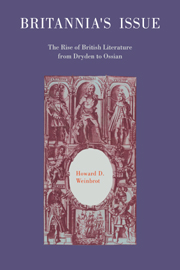Book contents
- Frontmatter
- Contents
- Acknowledgments and editorial notes
- INTRODUCTION: An overview of scope and method
- PART I CONTEXTS: INTELLECTUAL, PSYCHOLOGICAL, AND NATIONAL
- Prologue to Part I
- 1 MODERNS, ANCIENTS, AND THE SECULAR: THE LIMITS OF SOUTHERN HEGEMONY
- 2 THE SPIRITUAL: TRUTH WAS NOT THE INCLINATION OF THE FIRST AGES
- 3 AN AMBITION TO EXCEL
- 4 THE MAKING OF A MODERN CANON
- PART II TEXTS WITHIN CONTEXTS. ESSAYING ENGLAND: OUR GENIUS, OUR CLIME
- PART III GROWING ONE'S OWN. THE BRITISH ODE FROM COWLEY TO GRAY
- PART IV EXPANDING THE BORDERS. JEWS AND JESUS: THIS ISRAEL, THIS ENGLAND
- PART V CELTS, GERMANS, AND SCOTS: TOWARDS A UNITED KINGDOM
- APPENDIX: The text of Handel's “Israel in Egypt”
- Index
Prologue to Part I
Published online by Cambridge University Press: 15 December 2009
- Frontmatter
- Contents
- Acknowledgments and editorial notes
- INTRODUCTION: An overview of scope and method
- PART I CONTEXTS: INTELLECTUAL, PSYCHOLOGICAL, AND NATIONAL
- Prologue to Part I
- 1 MODERNS, ANCIENTS, AND THE SECULAR: THE LIMITS OF SOUTHERN HEGEMONY
- 2 THE SPIRITUAL: TRUTH WAS NOT THE INCLINATION OF THE FIRST AGES
- 3 AN AMBITION TO EXCEL
- 4 THE MAKING OF A MODERN CANON
- PART II TEXTS WITHIN CONTEXTS. ESSAYING ENGLAND: OUR GENIUS, OUR CLIME
- PART III GROWING ONE'S OWN. THE BRITISH ODE FROM COWLEY TO GRAY
- PART IV EXPANDING THE BORDERS. JEWS AND JESUS: THIS ISRAEL, THIS ENGLAND
- PART V CELTS, GERMANS, AND SCOTS: TOWARDS A UNITED KINGDOM
- APPENDIX: The text of Handel's “Israel in Egypt”
- Index
Summary
Clio has begun to wear more humble garb; but until recently there have been at least three dominant approaches to eighteenth-century British letters and culture. What we might call the princeps senatus is an eighteenth century either unified by a normative classical Augustan age, or divided into portions nonetheless characterized by a dominant classical past. This Augustan and neoclassical view has evoked some thoughtful and learned criticism, pedagogy, and scholarship regarding the eighteenth century. It also has evoked thoughtless labelling. In 1948 George Sherburn complained that “few centuries have with more facility been reduced to a formula than the eighteenth.” That sad truth scarcely hindered the organization of his literary history The Restoration and the Eighteenth Century around “The Rise of Classicism,” “Classicism and Journalism,” and “The Disintegration of Classicism.”
Many have inherited this noble Roman fabric. A denizen of the Massachusetts Cambridge, for example, says that the normative “true Augustans” saw in “Horace's poetry a concentrated image of a life and civilization to which they more or less consciously aspired.” A later denizen of the British Cambridge says that Pope's imitations recommend “the Augustan ideal in its civilized splendour.” Neither wooden stake nor silver bullet can keep Augustanism in its tomb. Its most recent acolyte knows that this “older view retains its persuasiveness,” though surely improved by New Historical and Marxist vocabulary. We nonetheless hear about Augustan England, its Augustan audience, English Augustan patricians, and Augustan universals that join Dryden (d. 1700) and Johnson (d. 1784).
- Type
- Chapter
- Information
- Britannia's IssueThe Rise of British Literature from Dryden to Ossian, pp. 19 - 24Publisher: Cambridge University PressPrint publication year: 1993



